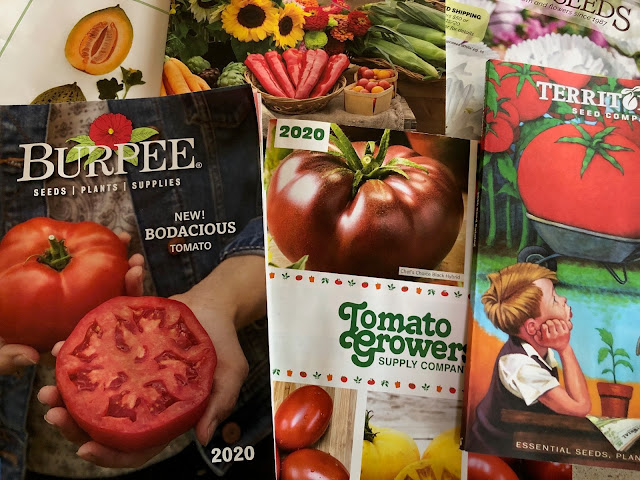
|
|
These are some of the new seed catalogs. Oh, they all look so promising, don't they? (Photo: Kathy Morrison)
|
New year brings new varieties, but read descriptions carefully
The seed catalogs started arriving more than a month ago, but I stacked them up, unopened, as the holidays progressed. I make it a rule not to read them until after New Year's Day -- partly because my brain isn't ready to calculate all the variables for the coming growing season.
But here it is Jan. 2 and I've finally cracked open my catalogs, and started browsing the online-only listings. I have to remind myself of some facts that are likely pretty typical among Sacramento-area gardeners:
-- I already own a lot of seeds.
-- I have a limited amount of space for vegetables.
-- I'm not a farmer and have only so much time for vegetable-tending.
-- It will be hot this summer, affecting yield, water needs and pollination.
So there's the
Burpee
catalog, with a giant red tomato on the cover. Do they know their market, or what? The variety is called Bodacious. But let's look at the details: The size, 10-12 ounces, is excellent for here, and the plants are listed as being compact, 5 to 6 feet. So far, so good. But 80-85 days is long for a hybrid. And here comes the big warning sign: "Toward the end of July, the bonanza begins." End of July, are you kidding? Might as well say "Toward the end of July, this plant will get fried and may not recover." Not going on my list this year.
I do love Burpee's Brandy Boy hybrid, and their yellow summer squash varieties, such as Butterstick, are excellent. My biggest issue with Burpee and other East Coast or Midwest seed companies is that they take forever to ship, even if the order is just seeds. I start my tomatoes at the end of January; anything that arrives later has to be saved for next year.
Peaceful Valley
,
Territorial Seed
and
Renee's Garden Seed
s are among the reliable West Coast suppliers. (Renee's has wonderful zinnia seed collections, if like me you prefer the big tall varieties.)
Botanical Interests
, a Colorado company, can be found in stores locally but check out the online site if you want to see all their varieties at once. I also like their recycled paper pots.
Wild Boar Farms
is about as local as you can get. Tomato breeding expert Brad Gates last year moved to Citrus Heights. He creates intriguing, wildly colored tomatoes. I like AAA Sweet Solano, a gold tomato, but his most popular include Brad's Atomic Grape and Berkeley Tie-Dye.
TomatoFest
also is a California company, with many great organic varieties; my issue with them is their seed packages are identical for every variety, lacking photos, dates and specific planting info.
Baker Creek
, which carries an overwhelming number of seeds of all kinds, is so fun to browse but their tomato collection is limited to heirlooms, which are problematic here.
My favorite seed supplier probably is
Tomato Growers Supply Co.
, which is in Florida, because they focus mostly on tomatoes and peppers. Their exclusive First Prize tomato is a consistent star, in my garden and in friends' plots. They also carry all of the Chef's Choice colors; my favorite is Chef's Choice Orange, least favorite is the pink one. Peppers I've had luck with include Jalaro, Purple Jalapeño, Shishito and, among the bell peppers, Early Sunsation.
So I'll spend the next week or so culling my current seeds. (I toss any pepper seeds older than 2 years, squash and melons after 3 years, tomatoes after 4.) Then dive into official orders. I try about 30 varieties of tomatoes a year, and wind up planting about 20.
If you're new to seed shopping, here's a little more advice I've culled from the last many years reading catalogs:
-- "Vigorous" means you'd better give it plenty of room and, for tomatoes, your sturdiest cage. Learn how to can them.
-- "Flavor worth waiting for" means it might, just might, produce a crop before fall.
-- Any variety that promises "a profusion" will tire you out from picking.
-- "Compact, perfect for containers." A very, very slow grower, whether it's tomatoes, squash or cucumbers.
-- "Early season, cold tolerant." It'll likely die early, too, if grown in the Sacramento flatlands.
-- "Intriguing flavor." After tasting the first one you won't know what to do with it.
-- "Unusual color." May be tasty, but not good for sharing. (Your non-gardener friends want red tomatoes. Trust me.)
-- "Sets well in heat." Not our heat.

